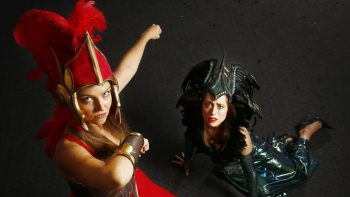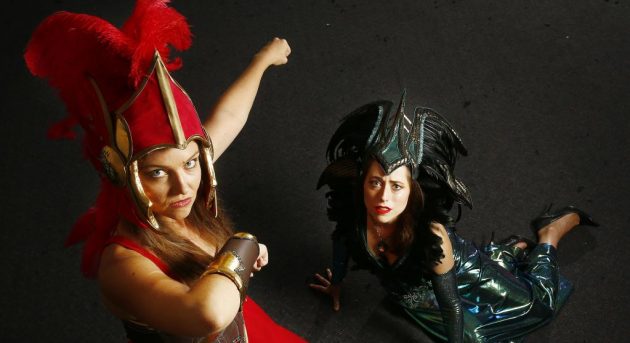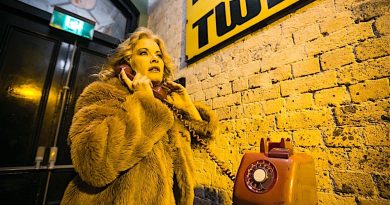Superhal – NIDA Parade Theatre
In a world that cannot deny the current pop-culture obsession surrounding comic book superhero film adaptations, Puzzle Collective’s Superhal – advertised as a “Superhero Origin Story” – seems like a slam-dunk take on Shakespeare’s Henry IV and V plays. Director John Galea describes it in the program notes as a “fully fledged archetypal origin story”, suggesting that Shakespeare’s plays can be tailored to the modern audience, even given their craving for spectacle and excitement.
It’s a compelling idea that might make the case for new relevance for these dusty history plays, but Superhal fumbles the execution and can’t deliver on its central concept; the only way it even comes close to connecting the dots between Shakespeare and the superhero genre is through cosplay/convention style costumes and orchestral music, and the end result is awfully camp.

Galea’s reinvention of the play seeks to characterise Hal (the future Henry V, Richard Hilliar) as the key protagonist of the play, tracking his relationship with Sir John Falstaff (John Michael Burdon) in a low-life underworld that juxtaposes to the grand royal life with his father, Henry IV (David Attrill).
Act I joins both Part I and II of Henry IV’s reign together, accumulating to a showdown which sees Hal and Henry IV collaborating together to fight against the ‘villains’, Mortimer (Seamus Quinn) and the Percys (Beth McMullen). The battle scene has both sides charging at each other in one of the few moments that the trope of superheroes is even remotely utilised.
Hal is crowned the new King from Act II, where Henry V follows a series of battles and his amusing attempts to woo French princess Catherine of Valois despite the language barrier.
This directorial concept hardly shifts the meaning either Henry IV or V plays. While understandably wishing to preserve Shakespeare’s language, the decision not to alter any language into the modern scape leaves gaping holes in how an 16th century plot plays into the tropes of the superhero – typically assuming they involve the discovery of superpowers and classic hero and villain rivalry. Contrary to its advertised material, Superhal never truly sought to innovate its Shakespearean origins, but instead it is caught up in its homage to Shakespeare and tackily tries to stick superhero references to the play to justify its relevance now.
Special effects were used sparingly and strangely timed, being utilised only in moments where the script directly references it, such as in the “Muse of Fire”soliloquy, where flames appeared for a couple of seconds before disappearing. Once again, Galea’s unsure choices in how the production should combine these superhero elements into the stories was one of the primary failures of Superhal, despite its strong potential to be significantly innovated.
Further, the language – paramount to shaping Hal’s world – is frequently lost under the loud rapping of a pop song or the overscore of “epic” orchestral strings. While the actors do their best at delivering their lines, notably Quinn as Mortimer and Hilliar as Hal, their talents are quickly overshadowed by the cheesy production value attached to the show. Technical issues on opening night contributed to inconsistent volume levels fading in and out between transitions and scenes, which didn’t help clarify the action onstage.
With a running time of over 3 hours, Superhal is simply a condensed version of Shakespeare’s two plays in one. In this aspect, it is unnecessarily long – with the first act totalling almost an hour and a half, and with the intriguing superhero notion quickly fading away, the second half is less appealing than the first. Ultimately, Puzzle Collective’s production works better in its ideas than its delivery – and not even its special effects could save the day.




